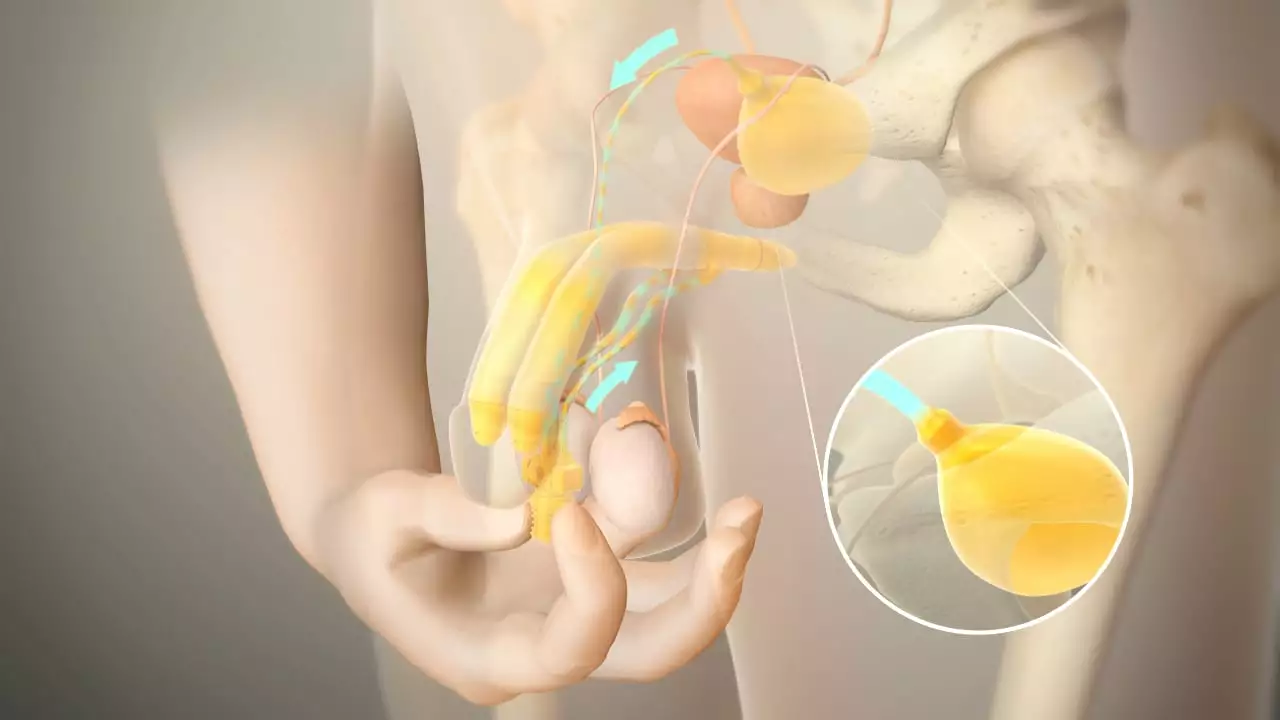
Understanding Penile Venous Leakage
Before we dive into the role of surgery in treating penile venous leakage, it is essential to understand what this condition entails. Penile venous leakage, also known as venogenic erectile dysfunction, is a condition where the veins in the penis cannot effectively retain blood during an erection. This leads to difficulty in achieving or maintaining an erection suitable for sexual intercourse. In this article, we will discuss the various surgical options available for treating penile venous leakage and their effectiveness.
Causes and Symptoms of Penile Venous Leakage
There are several factors that can lead to penile venous leakage, including aging, trauma, and certain medical conditions such as diabetes and pelvic surgeries. The primary symptom of penile venous leakage is the inability to maintain an erection, despite having sufficient arousal and desire for sexual activity. Men with this condition may also notice that their erections are less rigid and more difficult to achieve. In some cases, penile venous leakage can also cause premature ejaculation.
Diagnosing Penile Venous Leakage
Proper diagnosis of penile venous leakage is crucial in determining the most appropriate treatment options. A thorough medical history, physical examination, and various diagnostic tests, such as a penile Doppler ultrasound, are typically used to diagnose this condition. These tests help determine the extent of venous leakage and rule out other potential causes of erectile dysfunction.
Conservative Treatment Options
Before considering surgery, it is important to explore conservative treatment options for penile venous leakage. These may include lifestyle modifications, such as losing weight, exercising regularly, and quitting smoking. Additionally, medications like phosphodiesterase type 5 inhibitors (PDE5 inhibitors) can be prescribed to help improve blood flow to the penis and promote stronger erections. However, it is important to note that these conservative treatments may not be effective for everyone, and surgical intervention may be necessary for some men.
Surgical Treatment Options: Venous Ligation Surgery
One surgical option for treating penile venous leakage is venous ligation surgery. This procedure involves identifying and ligating (tying off) the leaking veins to prevent blood from flowing out of the penis during an erection. Venous ligation surgery has shown some success in improving erectile function, particularly in younger patients with localized venous leakage.
Surgical Treatment Options: Penile Implants
Another surgical option for treating penile venous leakage is the placement of a penile implant, also known as a penile prosthesis. Penile implants are devices that are surgically inserted into the penis to help achieve and maintain an erection. There are two main types of penile implants: inflatable and malleable (semi-rigid) implants. Inflatable implants consist of cylinders that are filled with fluid to create an erection, while malleable implants are bendable rods that maintain a constant level of rigidity. Penile implants are often considered a last resort for men who have not responded to other treatments.
Post-Surgical Care and Recovery
After undergoing surgery for penile venous leakage, it is essential to follow your surgeon's post-operative instructions and attend regular follow-up appointments. This ensures proper healing and helps monitor your progress. Recovery time and the resumption of sexual activity may vary depending on the type of surgery performed. It is important to discuss your expectations and any concerns with your surgeon before and after surgery.
Risks and Complications of Surgery
As with any surgery, there are risks and potential complications associated with surgical treatments for penile venous leakage. These may include infection, bleeding, pain, and changes in penile sensation. In some cases, surgery may not be successful in improving erectile function, and additional treatments may be necessary. It is crucial to discuss the potential risks and benefits of surgery with your healthcare provider before making a decision on treatment.
Conclusion
In conclusion, surgery can play a significant role in treating penile venous leakage for men who have not responded to conservative treatment options. Both venous ligation surgery and penile implants can offer improvements in erectile function, allowing men to regain their sexual health and confidence. However, it is essential to weigh the potential risks and benefits of surgery and explore all available treatment options with your healthcare provider before making a decision.




Alex Hughes
June 19, 2023I've seen this condition come up in my work with older patients, and honestly, the way medicine treats this is still so behind the curve. Venous ligation sounds good on paper, but the long-term data is thin. Most guys I've talked to who went through it ended up with scar tissue that made things worse. And don't get me started on how often doctors push implants like they're the only answer when really, the root cause is often vascular health, not just leaking veins. Lifestyle changes don't sound sexy, but they work better than most surgeries if you actually stick with them. I've had patients reverse their ED just by losing weight and doing pelvic floor exercises. It's not glamorous, but it's real.
Hubert vélo
June 20, 2023They don't want you to know this but the FDA and Big Pharma are hiding the truth about penile surgery. They're pushing these procedures because they make billions off implants and follow-up visits. The real cause? Electromagnetic radiation from 5G towers weakening the cavernous tissue. I've studied the Doppler scans - the patterns don't match natural aging. They're all aligned with cell tower frequencies. And why do they never mention the 1987 DARPA study on vascular disruption? Because they don't want you to connect the dots. They'd rather you pay $30k for a device than admit the system is rigged.
Kalidas Saha
June 22, 2023Brooo this is LIFE OR DEATH 😭 I had this and thought I was done for... then I found a guy in Mumbai who does this ancient Ayurvedic technique with herbal compresses and yoga breathing... like 3 months later I was back like a teenager 🤯 no surgery no implants just pure ancient wisdom 💪🫶 #PenileRevival
Marcus Strömberg
June 22, 2023I find it appalling that anyone would even consider surgery without first undergoing a full metabolic panel, a testosterone profile, and a psychological evaluation. The fact that this article even mentions venous ligation as a viable option without emphasizing the necessity of ruling out hypogonadism first is medically irresponsible. Most of these cases are just low T masked as venous leakage. And don't even get me started on the lack of mention of endothelial dysfunction - the real villain here. This isn't a surgical problem, it's a systemic failure of modern medicine's reductionist approach. You wouldn't fix a leaking roof by patching one hole while ignoring the rotten rafters underneath.
Matt R.
June 23, 2023Americans are so quick to jump to surgery when the real issue is laziness. You think a guy in Japan or Germany would be this eager to cut into himself? No. They work out, they eat clean, they don't sit on their butts all day watching Netflix. This is a symptom of a broken culture. We're obese, sedentary, and then we want a $40k device shoved in our dick like it's a video game controller. Meanwhile, the military has been using high-intensity interval training to reverse ED in soldiers for years. But no, let's just slice open a guy and stick a pump in him. That's the American way - quick fix, expensive, and completely ignores the root cause. We're not sick, we're weak.
Wilona Funston
June 23, 2023I've reviewed dozens of post-op cases in my clinical practice, and I have to say - the most consistent predictor of success isn't the type of surgery, but the patient's preoperative mental health and partner support. Men who approach this with shame or secrecy almost always have worse outcomes. Those who talk openly with their partners, engage in therapy, and accept that recovery takes months - those are the ones who thrive. The surgery itself is just a tool. The real healing happens in the quiet moments after the catheter comes out, when someone holds your hand and says, 'We'll figure this out together.' I wish the article had emphasized that more. Medical technology is powerful, but it's not magic. Human connection is the real cure.
Ben Finch
June 25, 2023Okay so like... venous ligation?? 😂 are we in 1998?? I mean, sure, if you wanna pay $25k and risk permanent numbness so you can get a semi-hard erection that feels like a rubber chicken... but like... have you HEARD of GAINSWAVE?? It's non-invasive, uses sound waves, no cuts, no implants, and you can go back to work the next day. Also, it's FDA cleared! And yet somehow this article is still talking about tying off veins like it's a DIY plumbing project?? Someone needs to update their references... or at least their Google search skills. 🤦♂️ #MedicineStillSucks